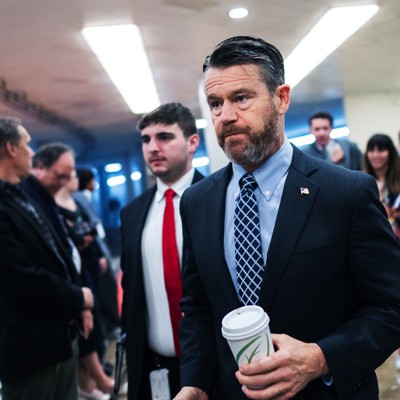The U.S. is falling behind in biotechnology development, Sen. Todd Young, R-Ind., said Wednesday—adding that he and other lawmakers are working to help the country catch up with China’s push to incorporate technologies like gene editing for human performance on the battlefield.
As the Trump administration slashes scientific research funding, Young and his colleagues are hoping to impress upon the executive branch the necessity of biotech as not just a national-security priority, but as an economic driver for its voter strongholds.
“One general category in which the Chinese, in particular, are out-classing us, is in bio-manufacturing, industrial applications of biotech – new materials, for example – and new life-saving compounds that could be a great utility to warfighters,” Young said at an event hosted by the With Honor Institute.
An April report by Young’s National Security Commission on Emerging Biotechnology made 49 recommendations for how the U.S. can invest in and use biotech in defense.
“Biological sensors could detect pathogens or chemical threats in real time, creating a dynamic and resilient system for battlefield awareness,” the report argued. “Biotechnology also promises new advantages in stealth and mobility. Dynamic biological camouflage, for instance, could shield warfighters from thermal detection, while wearable biosensors could adjust mission parameters based on real-time physiological data.”
There’s also the possibility of shelf-stable blood products for combat lifesaving, Young said, and “other materials that might actually be incorporated into our weapons systems in various ways.”
There are concerns in Congress about the administration’s cuts to science funding, including $4 billion from universities, hospitals and other institutions.
“I’m deeply, deeply alarmed by what’s happening in our basic science and research sectors,” said Rep. Chrissy Houlahan, D-Pa., a co-founder of the BIOTech Caucus. “It’s a chilling effect at the business level and at the individual science levels. It just doesn’t make any sense, that if we think we need to lead in manufacturing or lead in technology, why would we be blowing up the basic research that drives that?”
Houlahan and her colleagues on the House and Senate armed services committees have inserted a host of biotechnology measures into the most recent National Defense Authorization Act bill, including a mandate that the Pentagon create an official strategy for its efforts in the field.
Both Young and Houlahan pointed to the CHIPS and Science Act, a signature piece of Biden administration legislation, as a promising example of bipartisan support for investment in U.S. technology independence.
“The administration clearly has proven from the CHIPS Act that they can support industrial policy as long as they put their own signature on it,” Young said. “And in this case, they have an opportunity to stand up a program which will disproportionately benefit, from an economic standpoint, farm country USA.”
Opportunities for this type of manufacturing in states like his own Indiana, Young added, are “enormous.”
“They campaigned on restoring a golden age of innovation. They campaigned on a golden age of manufacturing. They particularly tried to connect with overlooked, under-appreciated people in rural America, and electorally, they disproportionately benefited from the support and encouragement of what was once disparagingly called flyover country,” Young said. “I will make a political argument, along with the policy argument, that they need to be attentive to this, otherwise another party will take the narrative and become the party of championing rural America and bio manufacturing.”
While the Trump administration has spent much of its first months in office “clearing” what it believed are the excesses of the federal government, Young added, the next step is to put forth a vision for building.
Read the full article here








Leave a Reply